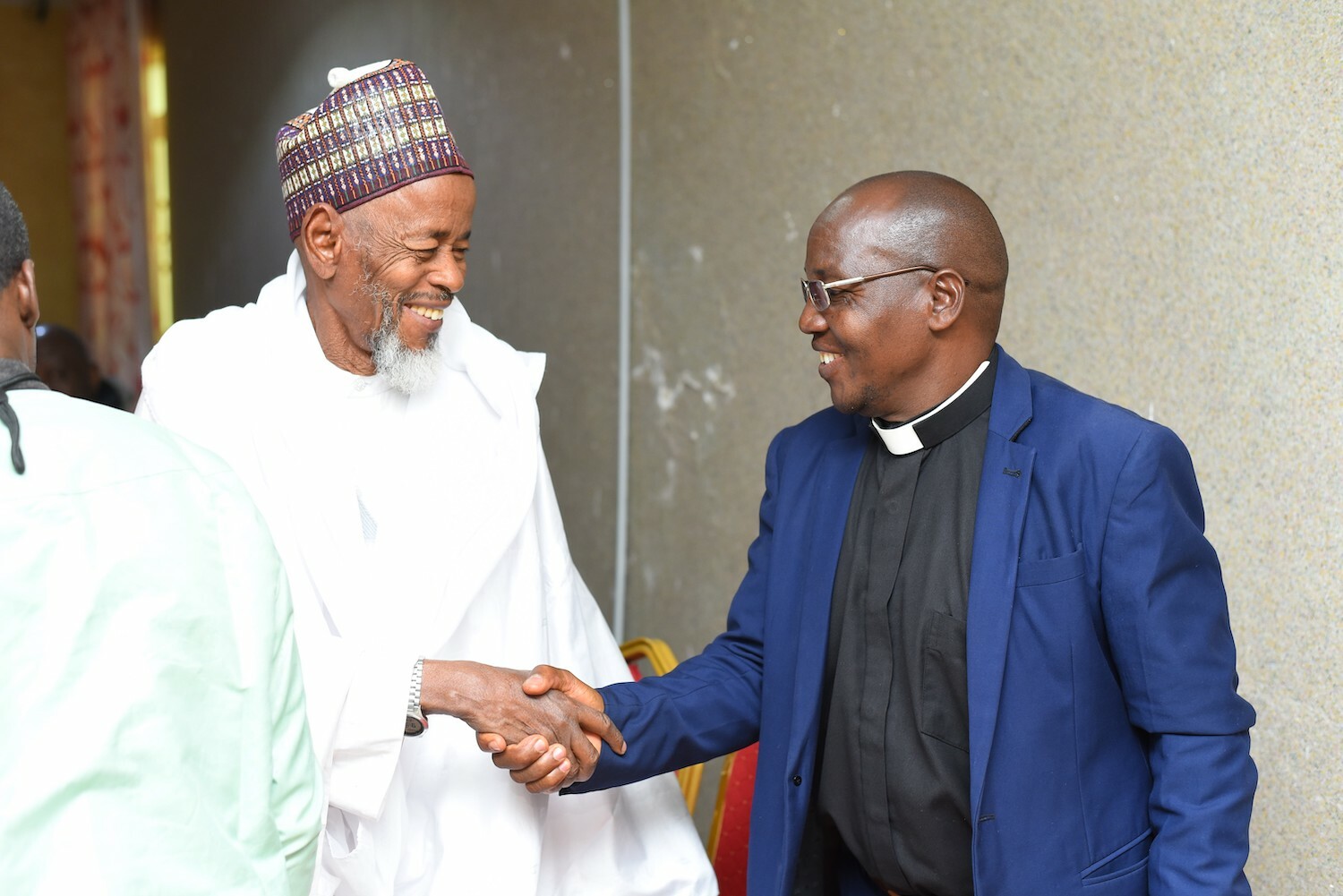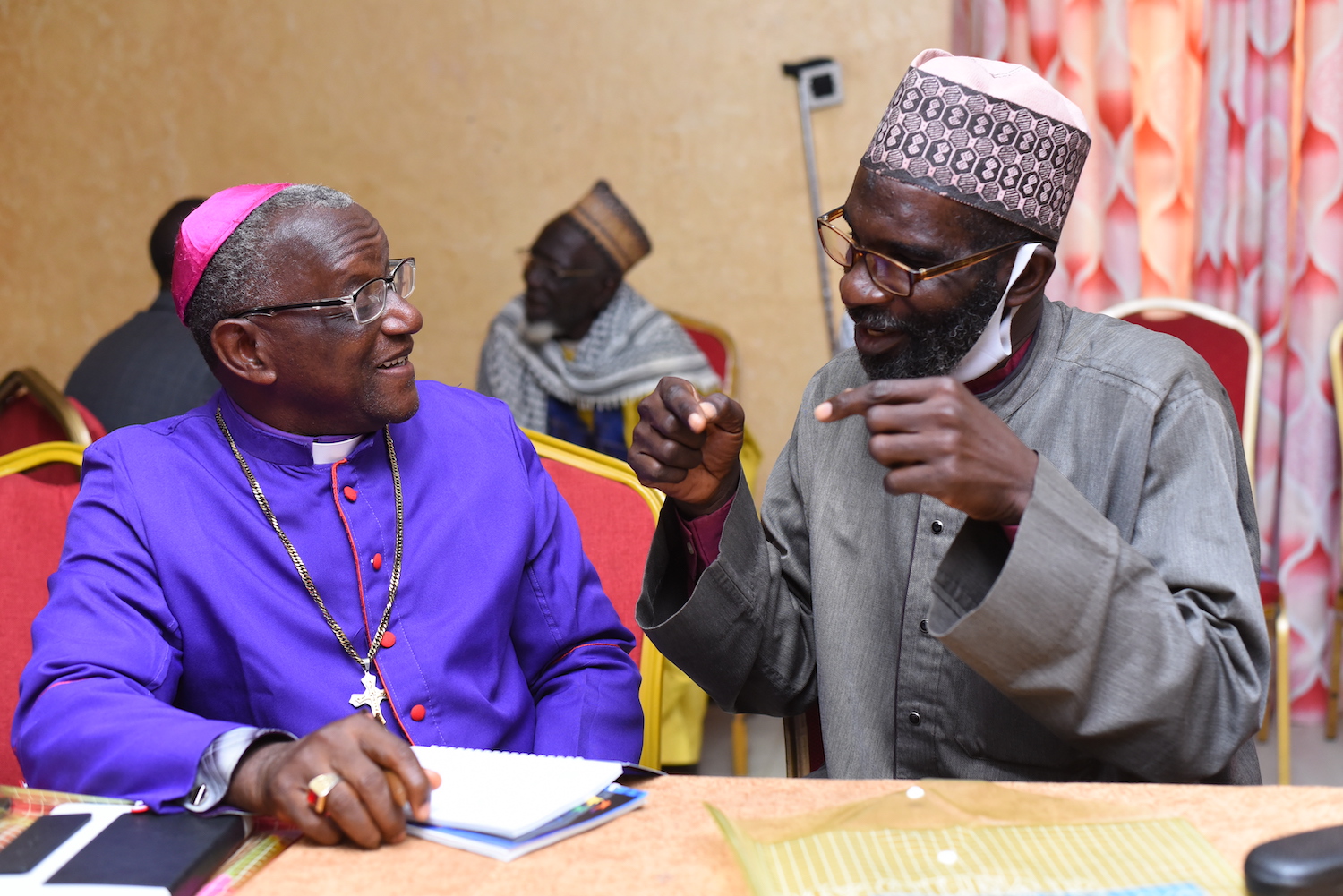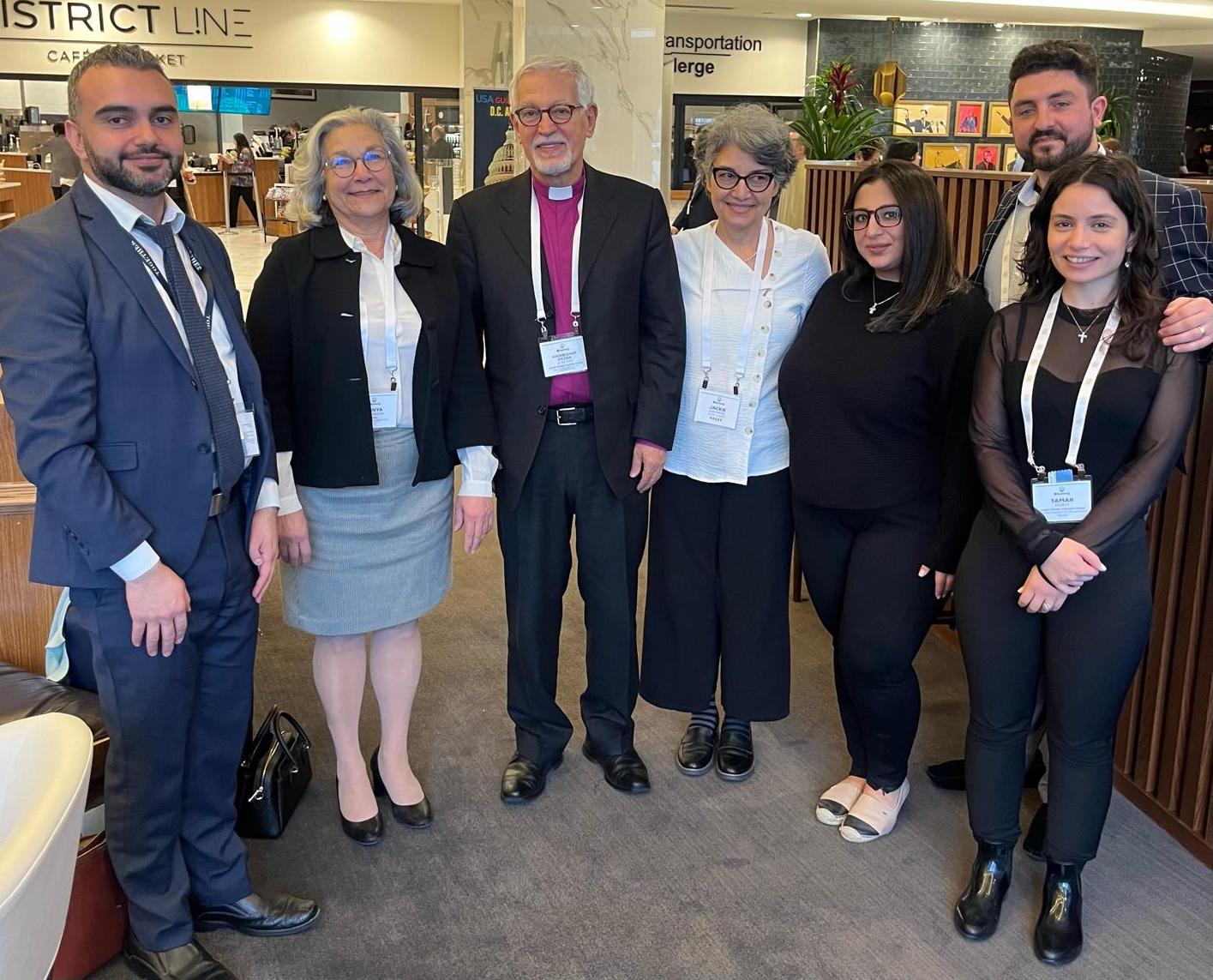Center for Multifaith Partnerships Hosts Forum at U.S. Capitol
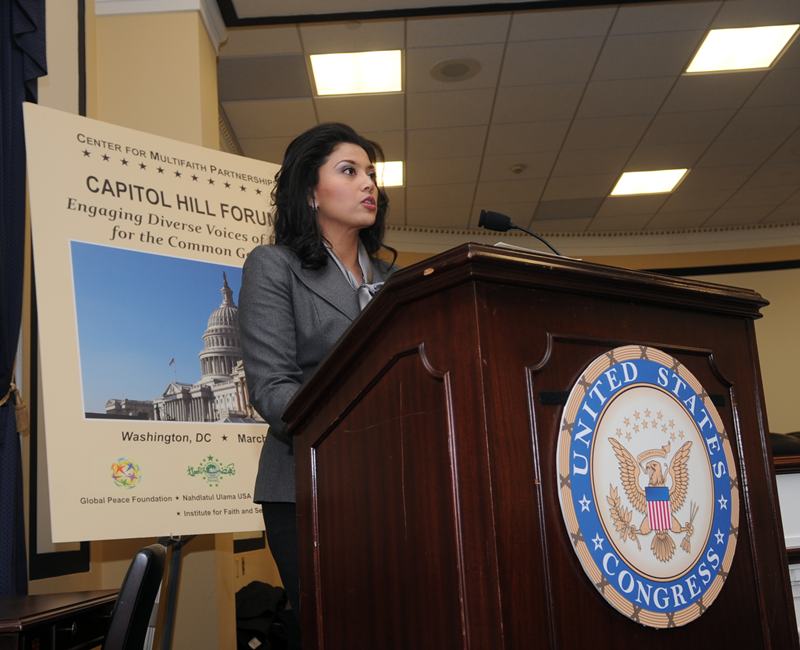
Dr. Rosa Djalal, President of the Muslim Women’s Association USA, addresses the forum of faith leaders at the U.S. Capitol. (All photos by Peter Holden)
WASHINGTON—Faith leaders representing Islam, Christianity and Hinduism told a forum in Washington, DC that religious traditions are rooted in shared principles and values that are essential in promoting peace. Among the forum speakers, three Muslim women passionately affirmed that Islam, the Quran, and Prophet Muhammad upheld the value and dignity of women, and advanced principles of justice, tolerance, and peace.
The forum, “Engaging Diverse Voices of Faith for the Common Good,” was hosted at the U.S. Capitol on March 20, 2013.
Meeting at a U.S. House Armed Services subcommittee hearing room—an irony noted by moderator Michael Marshall, editor emeritus at United Press International—panelists emphasized the importance of moderation and respect for the experience of viewpoint of others.
“Contrary to predictions, the world is not becoming more secular, but more religious,” said Rev. Mark Farr, Director of the Center for Multifaith Partnerships, a project of the Global Peace Foundation, which hosted the forum. “But we also need to accept that the entire world is not going to become Christian, Muslim, Buddhist, or Hindu. It’s not going to happen.”
Pondering what specific values could form the basis of meaningful progress in advancing peace, Rev. Farr proposed three principles: “Every life has intrinsic value; we are all inextricably bound together; and your experience, and opinion, is valid.”
Islam and peace
Countering the perception that Islam is intolerant or militant, Dr. Shalahudin Kafrawi, assistant professor of religion and philosophy at Hobart and William Smith College and Chairman of Nahdlatul Ulama North America, emphasized that peace—salaam—is the very foundation of Islam. “If Muslims have one single message, it is spreading peace,” he said.
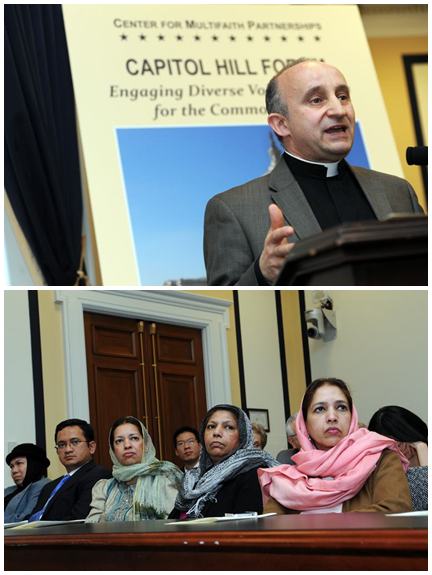
Rev. Mark Farr, Director of the Center for Multifaith Partnerships, and guests attending the forum.
Dr. Kafrawi noted that Indonesia-based Nahdlatul Ulama (NU), the largest Muslim organization in the world with some 70 million members, is founded on the principle of moderation and tolerance, which is grounded in the Quran. “For NU, Islam is to promote moderation, to build a moderate community. The message given to Muhammad was to show mercy and compassion to the world.” He added that to be a Muslim is to accept universal principles and values, the principle of unity of all people.
NU North America Vice President Dr. Etin Anwar, Associate Professor of Religious Studies at Hobart and William Smith College and wife of Dr. Kafrawi, also disputed the notion that Islam was incompatible with feminism, that Muslim women were oppressed or treated as second-class citizens. “If you look at the Quran from 1400 years ago, Muhammad started the feminist movement; Islam promotes the equality of all people,” she declared. She said that Islam has been adopted in many local cultures, and often those cultural traditions devalue women, in spite of Islamic principles that hold men and women equal.
Dr. Rosa Djalal, President of the Muslim Women’s Association USA and wife of Indonesia’s Ambassador to the United States, affirmed that Muslim women can and should play a significant role in ensuring peace in their communities and countries around the world. “If women are not involved in the peace process, peace is unlikely to be sustainable,” she said. “Moreover, I strongly believe that women, both Muslim and non-Muslim, have unique a perspective that allow them to be catalysts for peace and nation-building.”
Dr. Djalal added that Muslim women already play a pivotal role in defending and promoting peace in their communities and countries, noting the example of Iranian Nobel Peace Prize Laureate Shirin Ebadi, who throughout her career “has striven to show that Islam, women’s rights and social justice are compatible.”
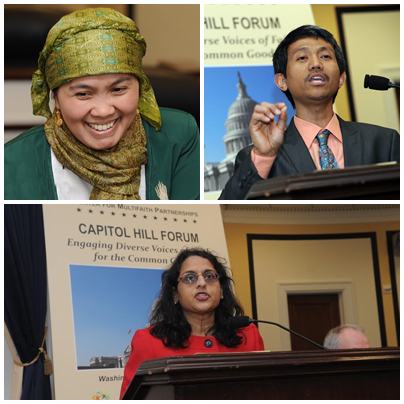
Top left: NU North America Vice President Dr. Etin Anwar; top right: Dr. Shalahudin Kafrawi, Chairman of NU North America; below: Ms. Anju Bhargharva , the founder and Executive Director of the Hindu American Seva Communities.
Panelist Ms. Anju Bhargharva , the founder and Executive Director of the Hindu American Seva Communities and member of President Obama’s Inaugural Council on Faith Based and Neighborhood Partnerships, identified the motives for peace at the root of Hindu faith. Greeting the forum with “namaste” and a traditional bow, she said the word and gesture meant “the divinity in me bows to the divinity in you.”
The ancient Vedic roots of the faith “had the ultimate goal of moksha, or self-realization, and the society was structured with the ultimate goal of finding the divine,” she said. “We also believe that out of many, the truth is one and you could find many paths to reach the mountain top.”
Ms. Bhargharva said many of India’s traditions have now become part of the spiritual landscape. “Meditation, yoga, are part of our practice, all meant to find the God within. And as we move forward I hope that many of our traditions will play a more significant role in building bridges and bringing people together. When you are out together—Christian, Jew, Muslim, Hindu—working to solve problems, you see the humanity there, you don’t see the “isms.”
“If women are not involved in the peace process, peace is unlikely to be sustainable.”
The final panelist, Ms. Emira Soleha Ramli a student at Syracuse University and intern at Islamic Relief USA, noted her respect for the Jewish Passover, which, like Ramadan, enabled faithful to reflect on the experience of oppression, hardship, or what it is like to be hungry. She said that she liked to learn about other faiths to encourage her to be a better Muslim.
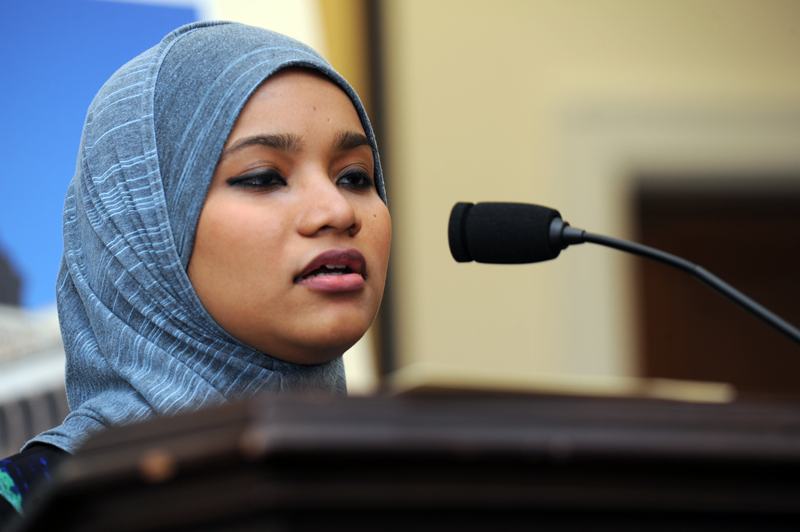
Ms. Emira Soleha Ramli, a student at Syracuse University.
Ms. Ramli also shared her fears about coming to America as a Southeast Asian and being stereotyped for wearing the hijab. “But I realized that one of the things we need to do as Muslims is to be present and show that we are part of the society. I realized that if Muslim women don’t go out there and talk, others will talk on behalf of us.”
Concluding her remarks she quoted Buddha, words that spoke to her not just as a Muslim but as a member of the human family: “Hate never dispels hate; only love dispels hate.”
The forum was co-sponsored by the Global Peace Foundation, Nahdlatul Uluma North America, Global Young Leaders Academy, and Institute for Faith & Service. U.S. Representative Hank Johnson (D-Georgia) was the Congressional sponsor.

